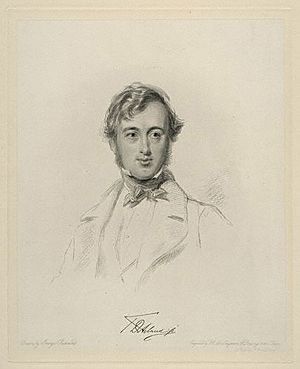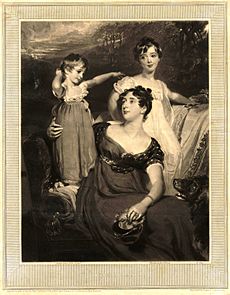Sir Thomas Dyke Acland, 11th Baronet facts for kids
Quick facts for kids
Thomas Acland
|
|
|---|---|
 |
|
| Member of Parliament for Wellington | |
| In office 1885–1886 |
|
| Preceded by | Constituency established |
| Succeeded by | Charles Elton |
| Member of Parliament for Devonshire North | |
| In office 1865–1885 Serving with Charles Trefusis, Sir Stafford Northcote, John Moore-Stevens
|
|
| Preceded by | James Wentworth Buller Charles Trefusis |
| Succeeded by | Constituency abolished |
| Member of Parliament for Somerset West | |
| In office 1837–1847 Serving with Edward Ayshford Sanford, Francis Dickinson
|
|
| Preceded by | Edward Ayshford Sanford Charles Kemeys-Tynte |
| Succeeded by | Charles Moody Alexander Hood |
| Personal details | |
| Born |
Thomas Dyke Acland
25 May 1809 |
| Died | 29 May 1898 (aged 89) |
| Political party | Tory, Liberal |
| Spouses |
Mary Mordaunt
(m. 1841; Mary Erskine
(m. 1856; |
| Relations | Sir Henry Acland, 1st Baronet (brother) |
| Parents | Sir Thomas Dyke Acland, 10th Baronet Lydia Elizabeth Hoare |
| Education | Harrow School |
| Alma mater | Christ Church, Oxford |
| Military service | |
| Branch/service | Royal 1st Devon Yeomanry |
| Rank | Major |
Sir Thomas Dyke Acland (born May 25, 1809, died May 29, 1898) was an important British politician and a champion for better education. He was known as the 11th Baronet, which is a special title. He served in the House of Commons, which is part of the British Parliament.
He was a Member of Parliament (MP) from 1837 to 1886. At first, he was part of the Tory party. After a break, he returned to politics as a Liberal.
Contents
Early Life and Family Background
Thomas Acland was the oldest son of Sir Thomas Dyke Acland, who was the 10th Baronet. His mother was Lydia Elizabeth Hoare. He had several siblings, including his brother, Sir Henry Wentworth Acland, who became a famous doctor. Another brother, John Acland, was also a politician.
His grandparents were Sir Thomas Acland, the 9th Baronet, and Henrietta Anne Hoare. His other grandfather was Henry Hoare, who was part of a well-known banking family.
Education and Early Achievements
Thomas Acland went to Harrow School, a famous school in England. After that, he studied at Christ Church, Oxford, which is a college at Oxford University. While there, he became friends with important people like William Ewart Gladstone, who later became a Prime Minister.
In 1839, he was made a Fellow of the Royal Society, which is a big honor for people who have made important discoveries in science.
Political Career and Public Service
In 1837, Thomas Acland began his political journey. He was elected to Parliament to represent the area of Somerset West. He was a member of the Tory party at this time.
Supporting Free Trade
During the 1840s, there was a big debate in the Tory party about the Corn Laws. These laws made food more expensive. Thomas Acland supported Sir Robert Peel, who wanted to get rid of these laws and allow for free trade. This meant he believed in letting goods be bought and sold without special taxes.
After 1847, he took a break from Parliament for almost 20 years.
Focus on Education and Farming
Even when he wasn't in Parliament, Acland was very interested in making education better. He first worked to support church schools. Later, he helped create the Oxford local examinations system in 1858. This system helped test students in different areas.
He also cared about farming. He was a Trustee of the Royal Agricultural Society. He helped hire Augustus Voelcker, an expert in agricultural chemistry, to advise farmers.
Military Service and Local Justice
Acland was also involved in the military. He was a Major in the Royal 1st Devon Yeomanry, which was a type of volunteer cavalry. Later, he became a Lieutenant-Colonel and then an Honorary Colonel in the local rifle volunteer corps. He was also a J.P. for the areas of Devon and Somerset. This meant he helped keep law and order in his local community.
Return to Parliament and Later Years
In 1865, Thomas Acland returned to the House of Commons. This time, he was a Liberal and represented Devonshire North. From 1869 to 1874, he worked as a Church Estates Commissioner, helping manage church properties.
He never became a government minister, but he was made a member of the Privy Council in 1883. This is a group of important advisors to the King or Queen.
In 1885, his old constituency was changed. He then became the MP for Wellington. However, he lost his seat in the 1886 election. This happened because he voted for a law called the First Home Rule Bill, which was about giving Ireland more control over its own government.
Patron of the Arts
Besides his public work, Thomas Acland also supported art. He was a friend of the famous writer and artist John Ruskin. He also admired the painter John Everett Millais early in his career.
Family Life
Thomas Acland was married twice. His first wife was Mary Mordaunt. They got married in 1841. They had three sons and two daughters together. Sadly, Mary passed away in 1851.
Their children included:
- Sir Thomas Dyke Acland, 12th Baronet (1842–1919), who also became a politician.
- Mary Lydia Acland (born 1846).
- Sir Arthur Dyke Acland, 13th Baronet (1847–1926), who also had a successful political career.
- Agnes Henrietta Acland (1851–1935).
In 1856, he married his second wife, Mary Erskine. They did not have any children together. Lady Acland died in May 1892.
Thomas Acland lived for six more years after his second wife passed away. He died in May 1898, at the age of 89. His oldest son, Thomas, became the 12th Baronet after him. His second son, Arthur, became the 13th Baronet later on.
 | William M. Jackson |
 | Juan E. Gilbert |
 | Neil deGrasse Tyson |


